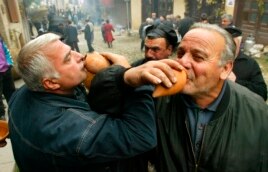30 July, 2018
For travelers who are interested in learning all about wine, the Republic of Georgia is the place to go.
France may be one of the best-known wine countries, but ancient remains show that Georgians began making wine at least 5,000 years before the French.
Last year, scientists found pieces of 8,000-year-old containers that were used to make alcohol.
You can experience that history -- and taste wine – all across the Georgian countryside. Hundreds of kinds of grapes grow in Georgia. Many families open small wineries. They still ferment the grapes in containers like those used thousands of years ago. Georgians call them "qvevri."
Visitors can even try a glass of unfiltered and golden-colored wine to get an idea of how wine first looked and tasted thousands of years ago.
The 11th-century Alaverdi monastery and winery is in eastern Georgia. Every September, Georgians from many different ethnic and religious backgrounds come to Alaverdi. They attend a festival called Alaverdoba. Today, Alaverdoba lasts about a week. But in ancient times, it lasted several weeks. It was a harvest celebration linked to pre-Christian groups.
Father Gerasim, bearded and dressed in a long black robe, said the Alaverdi monks are continuing a tradition passed down through generations.
"I remember when I was about 3 or 4 years old, my grandfather and father took me to the wine cellar every time they went. Wine ties, and tied, the human beings to his community, to his land," Gerasim said.

FILE - Georgian men drink wine during a wine festival in Signakhi, in the Kakheti region, Georgia, Saturday, Oct. 28, 2006.
More than wine
But Georgia offers visitors much more than just wine. The mountainous country appeals to all kinds of travelers.
There are 1,000-year-old churches, mountains offering winter and summer activities and hotels along the Black Sea.
In Tbilisi, the capital, you will find a mix of historic, old-world neighborhoods and modern riverfront areas.
Many small bakeries there make another of Georgia's famous offerings: khachapuri bread. This tasty, rich dish is shaped like a boat. In the middle is melted Georgian cheese and an egg.
There are costly restaurants, too, including PurPur. It mixes local foods with classic French-style cooking.
For a darker experience, visitors can head to the Joseph Stalin Museum. The site is in Gori, the birthplace of the former Soviet leader. It is a day trip from Tbilisi.
Travelers looking to rest can head to the Black Sea. There, you can stay at a spa or swim in the sea.
For those who prefer exploring the outdoors, the Caucasus Mountains rise more than 4,600 meters. Clear, cool lakes and rich valleys are hidden throughout.
The wild area is home to many kinds of animals, from golden eagles to Anatolian leopards. The area is also home to more than 6,000 separate groups of plants. Researchers believe the isolated mountain valleys may have helped protect plant species.
I'm Susan Shand.
Kevin Begos reported this story for the Associated Press. Susan Shand adapted it for Learning English. Ashley Thompson was the editor.
_______________________________________________________________
Words in This Story
wine - n. an alcoholic drink made from the juice of grapes
cellar - n. the part of a building that is entirely or partly below the ground
ferment - v. to go through a chemical change that results in the production of alcohol
bakery - n. a place where bread, cakes, cookies, and other baked foods are made or sold
unfiltered - adj. made without a device that is used to remove something unwanted from a liquid or gas
trendy - adj. fashionable
spa - n. a place where people go to improve their health and appearance by exercising, relaxing
isolated - adj. alone, without others